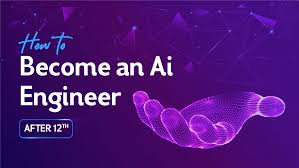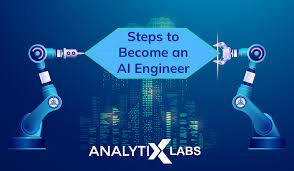
AI (Artificial intelligence) engineers becoming is challenging and a rewarding journey, that ‘s required a blend of education, technical skills and experience on0hands. AI has a advanced featured to improve and simplify tasks typically which are performed by humans, these tasks involves, image creation with AI tools, business management process and innovative businesses ideas can be generated with AI tools, Artificial intelligence (AI) also helpful in disease diagnosis. In this article, we’ll guide you to become an AI engineer, if you have not background in software programming.
What is AI engineering?
What does an Artificial Intelligence (AI) engineer do?
Artificial intelligence engineer is accountable for designing, developing and implementing AI systems and algorithms to solve problems. They work on making machine learning models, heavy learning networks and others AI-driven solution that can automate tasks, increase decision-making. Artificial intelligence engineers are required in choosing the appropriate algorithms, receiving and processing data, training models and optimizing them for correcting and performance. They also focus on integrating AI systems into existing software applications, protecting their scalability and efficiency. Moreover, AI engineers collaborate with data scientists, software developers and other stakeholders to protect that AI technologies within business goals.
Their work spans different fields, from healthcare and finance to entertainment and robotics, authorizing innovations like as predictive analytics, autonomous vehicles. The role requirements proficiency in programming, mathematics, data analysis and problems-resolving.
How to become an AI engineer?

Become an artificial intelligence involves a combination of education, technical skills and continuous learning. Here’s a detail guide in 6 steps on how to pursue this career
Step 1: Educational Background
The educational background involved to become an artificial intelligence engineer typically begin with a solid foundation in computer science or relevant field. Bachelor’s degree in computer science, software engineering, data science is the first and main step. This educational degree gives important knowledge in core subjects like as a programming, data structures and computer systems. Mathematics is important key area, with courses in calculus, linear algebra, probability and statistics forming the groundwork for understanding AI models.
Getting bachelor’s degree, pursuing a master degree in AI, machine learning or particularly field like as robotics or natural language processing is highly beneficial. A mater’s program allows students to get advanced knowledge and technical expertise, while also offering opportunities for research, projects and internships.
A PHD is pursued in some cases by those interested in conduction, cutting-edge research in AI, focusing on the development of the theoretical underpinnings of AI models. During this academic journey, students acquire the necessary theoretical knowledge, technical skills and practical experience to excel in AI engineering roles
Step 2: Getting Skill and Learn AI Concepts
To become an artificial intelligence engineer, mastering AI skills and AI concepts in important, as these form the backbone of the profession. Begin by understanding machine learning, which require creating algorithm that authorize systems to seek and make decisions from data. Key machine learning techniques include supervised learning and unsupervised learning.
Delve deeper into deep learning, a subset of machine learning, where artificial neural networks, particularly convolutional neural network (CNNs) and recurrent neural networks (RNNs) are used to process complex data like as images, text and time-series information. Knowledge with natural language processing (NLP) is also important, as it authorize AI systems to understand and generate human language, powering applications such a chatbots and translation tools.
Likely, knowledge of computer vision equips you to build systems capable of interpreting and analyzing visual data from images and videos. Dynamic decision-making is requiring for tasks, learn reinforcement learning, where models improve their performance via trial and error in interactive environments.
On the far side of these important areas, focus on the mathematical foundations of AI, adding linear algebra, calculus, probability and statistics as they underpin most AI algorithm. Proficiency in tools and frameworks like as TensorFlow, PyTorch, Keras and Scikit-learn is important for implementing these concepts.
Through mastering these skills, you’ll be equipped to design and develop intelligent systems that resolve real-word issues effectively.
Step 3: Learn Programming and Tools
Learn about programming and tools is a fundamental step in becoming an AI engineer, like these skills are important for building and deploying AI systems. Programming language form the foundation, with Python being the most famous selection due to its simplicity and a vast ecosystem of libraries for machine learning and data analysis.
Other languages such as a R, Java and C++ are also core for particular AI applications, like as a statistical modeling, performance critical tasks. Moreover, to programming, proficiency in AI libraries and framework is crucial for implementing machine learning and deep learning models.
Tools such a TensorFlow and PyTorch are mostly used for building and training neural networks, while Keras gives a user-friendly interface for rapid prototyping. Scikit-learn is a preferred selection due to its comprehensive suite of algorithms and utilities, for traditional machine learning tasks.
AI engineers must learn data manipulation libraries like Pandas for data wrangling and NumPy for numerical computations, to handle data effectively.
Familiarity with cloud platforms such a AWS, Google Cloud or Microsoft Azure is beneficial for deploying AI models and leveraging scalable resources for training huge datasets. Through mastering these programming language and tools, you’ll have the technical capabilities required to design, implement and optimize AI systems efficiently.
Step 4: Experience Hands-On
To becoming AI engineer, gaining hands-on experience is crucial, like it bridges the gap between theoretical knowledge and practical application. Engaging in projects is one of the best ways to develop real-world skills, this could require making machine learning models, building chatbots, developing recommendation systems or participation in competitions on platform such a Kaggle.
These projects allows you to apply algorithms, process data, train models and optimize performance, providing you a practical understanding of AI workflows.
Internship offer another core opportunity to work in a professional environment, where you can apply your skills on real business problems, collaborate with experienced professional and learn industry best practices.
Additionally, contributing to open-source projects on platforms like GitHub helps you refine your coding skills, collaborate with the AI community and gain feedback from other developers. It will not only increase your practical skills but also builds a portfolio that demonstrates your capabilities to potential employers.
Step 5: Specialization and Stay Updated
Specialization in a particular area of AI and staying updated with the latest advancements are critical for long-term success such as a AI engineer. Providing the broad scope of AI, it is beneficial to select a specialization that collaborate with your interests and career goals. Common areas of specialization adding machine learning engineering, which focuses on creating scalable machine language systems: deep learning , where you design and optimize neural network; natural language processing (NLP), which required building systems that understand and generate human language; computer vision, where AI interprets visual data and AI research, which focuses on developing new algorithms and theoretical advancements.
In this fast-evolving field to stay updated, its important to keep up with current research and industry trends. Reading research papers from conferences like as NeurIPS, ICML and CVPR helps you stay informed about cutting-edge techniques and innovations. Through specializing and staying updated, engineers can maintain a competitive edge and ensure that your knowledge remains related in the rapidly advancing field of AI.
Skills Required TO Become An AI Engineer?
To become an AI engineer, a diverse set of technical and soft skills is required to effectively design, implement and optimize AI systems. Here’s a breakdown of the important skills for Become an AI Engineer:
Technical Skills
- Machine Learning Skill
Machine learning knowledge, is crucial for an AI engineer in depth. Knowledge of algorithms as like regression, classification, clustering and reinforcement learning.Expertise in neural networks, specially convolutional Neural Network (CNNs) for image data and Recurrent Neural Networks (RNNs) for sequential data.
- Programming
Learn programming is most important to become an AI engineer. The most widely used language in AI due to its simplicity and rich ecosystem of libraries.Famous programming language C++, R, Java is useful for particular tasks such as statistical analysis, large-scale system, or performance critical applications.
- Statistics and Mathematics
Statistics and mathematics leaning is essential for understanding algorithms related to neural networks and machine learning models. Moreover, calculus important for optimization techniques used in taring AI models.Probability and statistics are crucial for making predictions, understanding distributions and evaluating model performance.
- Framework and AI Libraries
Framework and AI libraries are important tools for AI engineers, enabling them to efficiently build, train and deploy machine leaning and deep learning models. TensorFlow developed by Google, is one of the most famous deep learning framework. Similarly, PyTorch, created by Facebook is favored for its dynamic computational graph and easy of use, creating it ideal for research and production.
Scikit-learn is the go to library for traditional machine learning tasks, offering a vast range of algorithms for classification, regression, clustering and more along with tools for model evaluation and data preprocessing. More notable libraries include OpenCV for computer vision applications, NLTK and SpaCy for natural language processing and XGBoost for gradient boosting tasks.
Soft Skills
- Abilities for Problem-Solving and Analytical Thinking
For an AI engineer, problem-solving ability and analytical thinking are important, such as they encounter critical challenges that involve innovative solutions. Problem-solving require breaking down critical issues into manageable parts, identifying patterns and devising strategies to address them. Analytical thinking enables AI engineer to evaluate data, interpret results and refine models based on insight. These skills help in debugging algorithms, optimizing performance and ensuring the AI systems function correctly. Strong problem-solving and analytical abilities allow AI engineer to adapt to new situation, troubleshoot effectively and build creative approaches to creating robust AI application.
- Continuous Learning
Continuous learning is a key aspect of being an AI engineer, due to the rapidly requiring nature of the field. AI technologies, algorithms and best practices are constantly advancing, making it important for engineers to stay updated with latest research and developments. This requires regularly reading academic papers, taking online courses, participating in workshops and attending industry conference.
- Collaboration and Version Control
Version control and collaboration are important components of an AI engineers workflow, particularly when working in team or on critical projects. Version control systems, like Git, help manage code change, track modifications and maintain a history of contributions, making it easier to collaborate on projects without conflicts. Platforms like as GitHub or GitLab enable multiple developers to work simultaneously, merge code and review changes efficiently.Effective collaboration involves clear communication, code documentation and adherence to coding standards to ensure that all team members can contribute seamlessly.
- Communication Skills
Communication skills are essential for AI engineers to effectively convey complex technical views to non-technical stakeholders, like as business leaders, clients and team members. Clear communication ensure that the goals, limitations and outcomes of AI projects are well understood by all parties involved. This ability also facilitates collaboration within teams, enabling better coordination and problem-solving. Effective communication bridges the gap between technical expertise and business needs, ensuring that AI projects align with organizational objectives.
- Time Management
Time management is critical skill for AI engineers, make them to efficiently handle multiple tasks, meet project dealines and balance different responsibilities. Providing the complexity of AI projects, which often requires data preprocessing, model training, tuning and deployment, effective time management make sure that each phase is completed within the involved timeframe. What are the responsibilities of an AI Engineers?
To become an AI Engineer is not simple task, an AI engineer there are many responsibilities. Here’s are some curcial responsibilities of an AI engineers:
- Develop AI modals to solve particular problem using machine learning and deep learning algorithms.
- Collect and preprocess data to ensure it is suitable for training AI models.
- Train and evaluate models by fine tuning hyperparameters and using performance metrics.
- Optimize models for efficiency, scalability and speed.
- Deploy AI solutions into production environments and monitor their performance.
- Collaborate with cross function teams including data scientists, software developers and business stakeholders.
- Document AI systems and processes for maintenance and understanding by other team members.
Conclusion
Frequently Asked Questions (FAQs)
Is AI engineering a good career?
How to build a careen in AI ?
what is AI Engineer salary?
The salary of an AI engineer varies significantly across different countries, influenced by factors like as local demand, cost of living and industry presence.
Below are overview of average annual salaries for AI engineers in different regions:
United States: AI engineers earn between $110,000 and $150,000 per year, with top positions reaching up to $200,000 or may be more.
Canada: Salaries range from CAD 93,075 to CAD 1164,568 annually, with an average around CAD132,595.
United Kingdom (UK): AI engineers typically earn between £29.283 and £93,267 per year, with an average salary of approximately £52,260.
India: An AI engineers in India annual salaries range around from ₹330,000 to ₹2,420,000, with an average of around ₹940,436.
These figures are approximate and can vary based on experience, education, company size and specific jon responsibilities.
How long does to become AI Engineer?
What is the salary of AI engineer in U.S?
Can you become AI engineer without a degree?
Is AI engineering hard?
How to learn AI in 2025?
Where do i start to become an AI engineering?
To start your journey toward becoming an AI engineer,:
- begin by building a strong foundation in mathematics, specially in area like linear algebra, clculus and statistics, as these are important for understanding machine learning algorithms.
- Learn programming language like as Python and R, which are widely used in AI development.
- Explore online courses on platforms like courses, edX or Udem to study machine learning , deep learning and AI frameworks like TensorFlow and PyTorch.





